As with all pet food content I write, I aim to provide transparency and useful information. This Honest Kitchen dog food review is going to cover everything from where the food is manufactured to whether or not it is nutritionally sound for your pet.
I’m tired of pet food reviews that simply regurgitate and endorse the company’s marketing. You won’t find that here.
Years ago, I fed Honest Kitchen food to my little dog.
I distinctly remember preparing a bowl of it for my dog while my family was visiting, and they all kept saying that it looked like dog puke.
They weren’t kidding. It’s true.
Honest Kitchen invests heavily in marketing its brand, but whether its claims are supported by evidence justifying the extra expense remains to be seen.
The Honest Kitchen sells dehydrated pet food (that must be prepared before serving), wet food, and “clusters” (their take on kibble). This is not a typical pet food brand, and that’s part of the appeal.
Let’s dig in!
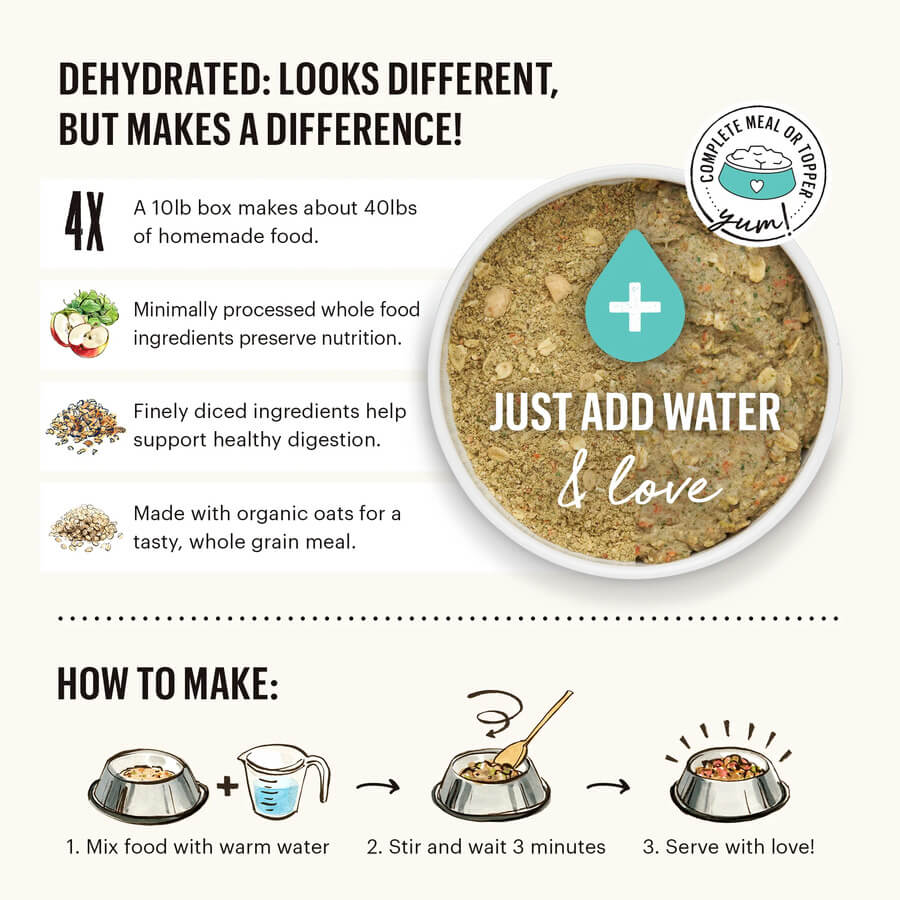
Honest Kitchen Marketing Claims
The Honest Kitchen pet food company makes the following claims in its marketing:
- Human-Grade Ingredients
- Wholesome and Natural
- Balanced Nutrition
- Convenient Preparation
- Transparency
- Limited Ingredient Options
- Palatability
- High-Quality Standards
These things are of course, very appealing to pet parents looking for a high-quality diet! Many companies make these same claims, so is Honest Kitchen different?
What is Human Grade Dog Food?
The Honest Kitchen claims to produce only “Human-grade” food and says that they are the only food brand authorized by the FDA to make that claim on their products. What they mean is that the FDA inspected their facilities and provided a letter of “no-objection” to Honest Kitchen using that term in their marketing.
It’s not that the FDA has a designated term that requires companies to adhere to it, it’s that they had no reason to object to the term when Honest Kitchen asked them to verify.
In 2009, the AAFCO decided to release a formal definition of “human grade” for pet food, which you can read here.
None of this is a bad thing! It shows a dedication to quality ingredient sourcing and manufacturing practices (which, can be possible in pet foods that aren’t labeled “human grade” as well).
You can read more about this HERE from Tufts University.
The concept behind “human grade” dog food is that it will have been manufactured using the same strict attention to cleanliness, pathogen management, and quality as human food.
There’s a common misconception that “pet quality” foods are produced using diseased slaughterhouse waste and low-quality fillers with lax quality control measures. (Read more here about the “euthanized animals in pet food” myth).
Boutique pet food companies, such as the Honest Kitchen, leverage this belief to their advantage by claiming that their food meets the supposedly higher “human-grade” standards.
However, food scientists know better than this.
The truth? In many ways pet foods have much stricter regulations on them than human foods, especially when it comes to raw meat!
Why is this? Because human food is meant to be cooked at home, which kills pathogens. Pet food must be safe straight out of the bag.
Additionally, humans handle pet food in their homes; it cannot contain pathogens and toxins that may be harmful to people.
I do not doubt that the Honest Kitchen has good quality control and sources high-quality ingredients. Where pet owners need to tread cautiously is in misleading marketing such as “human grade” that is meant to position food as superior.
Many pet food companies selling “pet grade” foods adhere to insanely high standards, and they have to (because the regulations, believe it or not, demand it).
A lot of the meat, grains, and supplements seen in more traditional pet foods are coming from suppliers who produce those same ingredients for human consumption.
In theory and according to some standards, the moment it’s shipped for use in pet food, it’s no longer “human grade”, even if it’s identical to the product shipped to a facility making food for humans. Based on that logic, Honest Kitchen is not actually “human grade”, unless you plan to pour yourself a bowl and eat it for dinner.
There are also major environmental and ethical considerations when it comes to using super high-quality anything for pets. Pets don’t need “top quality” anything in their diet. In nature, they will eat entrails, bones, bugs, and organs. In our homes, they will eat trash and poop.
When the human meat industry processes chickens, there are nutritious bones, organs, and tissues left behind. Many pet food companies use these ingredients instead of allowing them to go to waste, however, the Honest Kitchen would not because it goes against their beliefs about quality.
Food for thought!
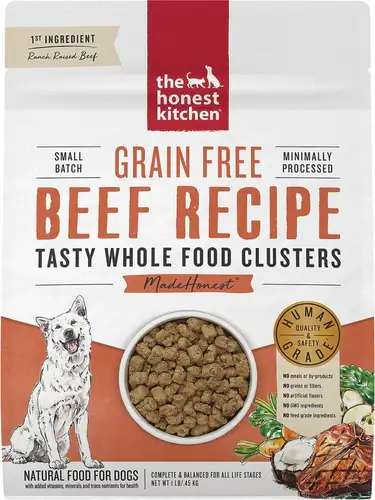
Does Honest Kitchen Meet WSAVA Recommendations?
WSAVA’s recommendations for pet food focus on factors such as nutritional research, quality control, and manufacturing standards, which are essential considerations for any pet food brand claiming to offer balanced and high-quality nutrition.
I’ve dug into some very common WSAVA guidelines below to determine if Honest Kitchen adheres to them.
Who Formulates Honest Kitchen Dog Food?
The first place I look is the Pet Nutrition Alliance Manufacturer’s Report, which asks pet food companies to answer a few simple questions regarding their nutritionist and where the food is manufactured.
As of 2023, The Honest Kitchen had not responded to those inquiries. Based on my experience, when a company chooses not to publish such answers for the Pet Nutrition Alliance, it suggests that they may not adhere to the highest standards.
So of course, I had to go digging.
The Honest Kitchen states that they “work with a team of renowned veterinarians, including an ACVN-accredited veterinary nutritionist, to create each and every recipe“.
This means that they use unnamed consultants with variable credentials in their formulations, and none of them are on staff or employed by the company. Having an ACVN veterinary nutritionist involved in the formulation process is incredibly valuable, but without a direct relationship, it’s difficult to ascertain the extent of their contribution.
Where is Honest Kitchen Dog Food Made?
Most Honest Kitchen food is made in an unnamed “human-grade” facility that also manufactures soup, cereal, and milkshake powders.
In 2021 they opened a manufacturing plant for their “clusters” pet food (which is similar to kibble). I was unable to verify how much of their manufacturing is done at this plant.
I do believe that in general, the Honest Kitchen does meet high standards for ingredient sourcing, manufacturing practices, and overall management of pathogens and toxins.
Does Honest Kitchen Do Feeding Trials?
The Honest Kitchen brand has not completed traditional AAFCO feeding trials, instead indicating that they have “exceeded them” with a series of at-home trials.
At-home trials can be complicated, as pets in the home environment cannot be adequately monitored for accidental or intentional ingestion of other foods, treats, and supplements. Additionally, because each dog lives in a very different environment, it’s hard to objectively compare them.
In-home trials are helpful and can provide useful information, and it’s a far cry ahead of companies that do nothing at all. However, I’m not convinced that at-home feeding trials are all that superior.
The Honest Kitchen claims that their 6-month feeding trial of 24 dogs indicated positive results for each dog. However, they only tested three recipes among several in their product line.
The Honest Kitchen claims to be ethically and morally opposed to traditional feeding trials done in a laboratory environment. This take implies that dogs that participate in “traditional” tests are abused and live horrible lives locked in cages.
This is simply not true. It’s a complete myth and I have serious complaints about pet food companies that spread such misinformation.
Many people who work in pet food testing facilities will tell you that the dogs there receive tons of playtime, attention, enrichment, and care. They are groomed, loved, and trained. Those dogs receive regular veterinary care and are not subjected to torture or abuse as many would imply.
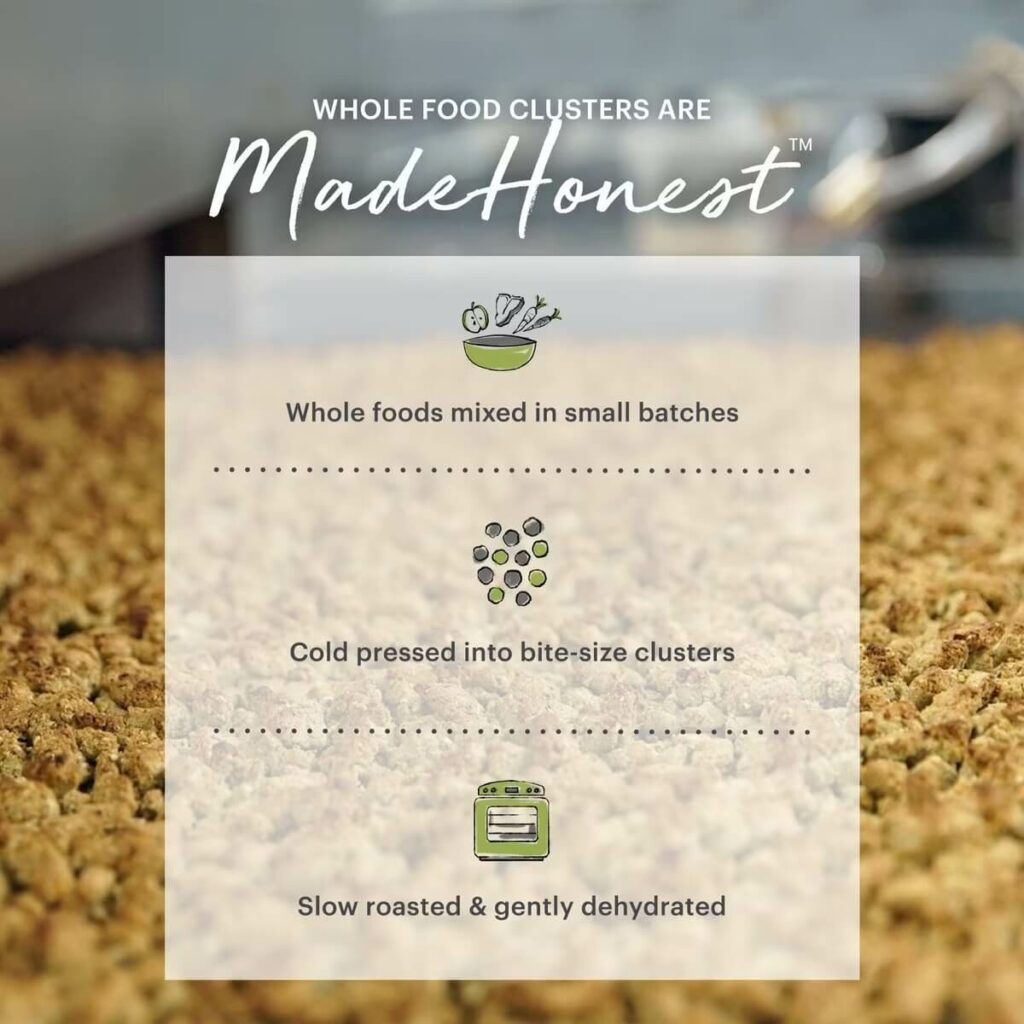
Is Honest Kitchen Endorsed by Veterinarians?
Kind of.
What I mean by this is that the only endorsements or collaborations I can find are with “holistic” veterinarians, and a review is hardly considered an endorsement.
Holistic and integrative veterinarians can be helpful in some situations, however, they are unfortunately known for denying published research and utilizing “natural” treatments and solutions with questionable efficacy and safety.
I’d like to see evidence-based veterinarians endorse or recommend Honest Kitchen as well, however, they don’t (at least not publicly or online). I’m always cautious when the only veterinarians that will recommend or endorse a food are “holistic”.
I have no doubts that there are exceptional holistic and integrative veterinarians out there. Regrettably, however, many of them have demonstrated a tendency to prioritize profit-driven motives, leveraging sensational headlines for their financial gain, and using their platforms to spread misinformation about pet health, food, and care.
It makes it very difficult to take them seriously.
Are the Ingredients in Honest Kitchen Good?
We are not veterinary nutritionists, so we cannot truly evaluate and assess this topic. This is a great article from Tufts University about evaluating pet food ingredients.
So while we cannot determine if this food is nutritionally sound, we can take a look at what’s in it. Their grain-free formulas ARE heavy in peas and potatoes, which may increase the risk of nutritional DCM (more on this below).
I pulled a random ingredients list from one of their most popular grain-inclusive foods, The Honest Kitchen Whole Grain Beef Recipe Dehydrated Dog Food.
Dehydrated Beef, Organic Oats, Organic Barley, Organic Flaxseed, Dehydrated Potatoes, Dehydrated Carrots, Dehydrated Eggs, Dried Apples, Dried Parsley, Dried Cranberries, Dehydrated Spinach, Minerals [Tricalcium Phosphate, Potassium Chloride, Choline Chloride, Zinc Amino Acid Chelate, Iron Amino Acid Chelate, Potassium Iodide, Copper Amino Acid Chelate, Sodium Selenite], Taurine, Vitamins [Vitamin E Supplement, Vitamin B12 Supplement, Thiamine Mononitrate (Vitamin B1), D- Calcium Pantothenate (Vitamin B5), Riboflavin (Vitamin B2), Vitamin D3 Supplement].
There is nothing wrong with any of these ingredients, and I do not doubt that they have all been purchased from quality suppliers. Beef, oats, and barley are traditional and well-researched pet food ingredients.
As a pet parent, I would not hesitate to purchase and use this food as a nutritious topper or to stuff puzzles such as the West Paw TOPPL!
You can see this food on Chewy HERE.
For comparison, I also pulled The Honest Kitchen Food Clusters Whole Grain Chicken and Oat ingredients list. Clusters are Honest Kitchen’s take on kibble.
Chicken, Oats, Barley, Chicken Liver, Carrots, Eggs, Ground Flaxseed, Broccoli, Pumpkin, Apples, Natural Chicken Flavor, Coconut Oil, Kale, Chia Seed, Salmon Oil, Minerals [Tricalcium Phosphate, Sodium Chloride, Potassium Chloride, Iron Amino Acid Chelate, Copper Amino Acid Chelate, Manganese Amino Acid Chelate, Zinc Amino Acid Chelate, Sodium Selenite], Fenugreek Seed, Dried Kelp, Taurine, L-Carnitine, Vitamins [Vitamin A Supplement, Vitamin D3 Supplement, Vitamin E Supplement, Niacin Supplement, Folic Acid, Thiamine Mononitrate (Vitamin B1), Riboflavin (Vitamin B2), Calcium Pantothenate (Vitamin B5), Pyridoxine Hydrochloride (Vitamin B6), Vitamin B12 Supplement, Choline Chloride ], Mixed Tocopherols (A Natural Preservative), Turmeric, Dried Bacillus Coagulans Fermentation Product, Rosemary Extract.
Like the dehydrated beef recipe, this appears to be another food with several traditional, highly researched ingredients such as chicken, barley, and oats.
However, there’s a concern regarding the chicken content in this food. Although it is listed as the first ingredient, it doesn’t specify whether it was dehydrated or processed into a meal beforehand. This can suggest that its position as the primary ingredient may be due to water weight, not nutrient density in the finished food.
Honest Kitchen clusters are “cold pressed”. This means that individual ingredients are cooked before being pressed into shapes at low temperatures (around 100 degrees Fahrenheit). It’s not actually ‘cold’ nor is it raw.
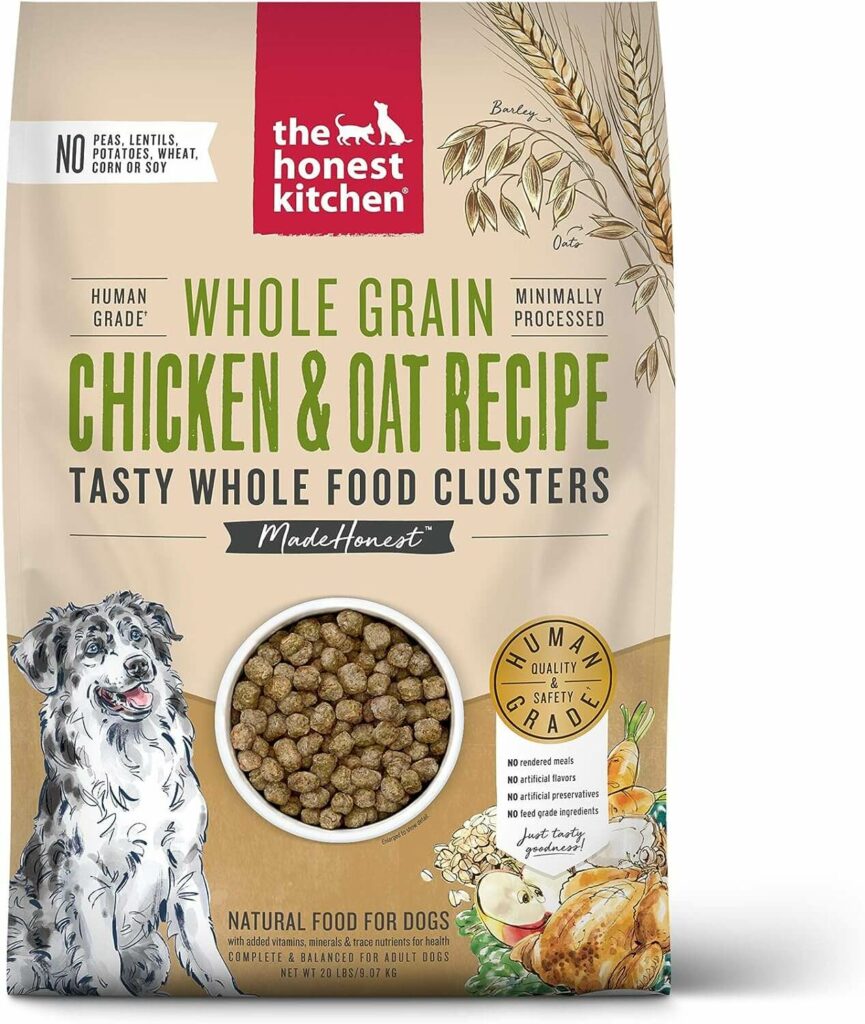
What is the Carb Level in Honest Kitchen Pet Food?
The Honest Kitchen publishes detailed nutritional information HERE.
I must admit, I was thoroughly impressed by the level of detail and comprehensiveness provided by Honest Kitchen. In contrast to many companies that make you hunt for such details or even refuse to provide them altogether, Honest Kitchen’s transparency is refreshing.
I used their tool to pull random samples of food and here is what I found.
Every sample was 42-50% carbs, which is in line with most dry kibble foods.
The Honest Kitchen contains average carb levels.
There is nothing wrong with carbs in pet foods and I appreciate that they embrace healthy grains such as barley and oats which provide amino acids and energy.
What is the Copper Level in Honest Kitchen Pet Food?
None of the samples I pulled had concerning levels of copper.
All of them fell right in range with the averages we see from science-backed companies such as Purina, Royal Canin, and Eukanuba.
In recent years, researchers have raised concerns about excess copper content in pet foods contributing to a rise in copper storage and liver diseases. The FEDAIF (European) recommends capping copper at 28 mg/kg. Many foods in the U.S. well exceed that level, especially from “holistic” and boutique-type pet food companies.
However, this value appears to be well controlled in Honest Kitchen, running in the neighborhood of 10 – 22 mg/kg of copper on average.
If you are concerned about copper levels in your pet’s food, verify that information with the company before feeding it.
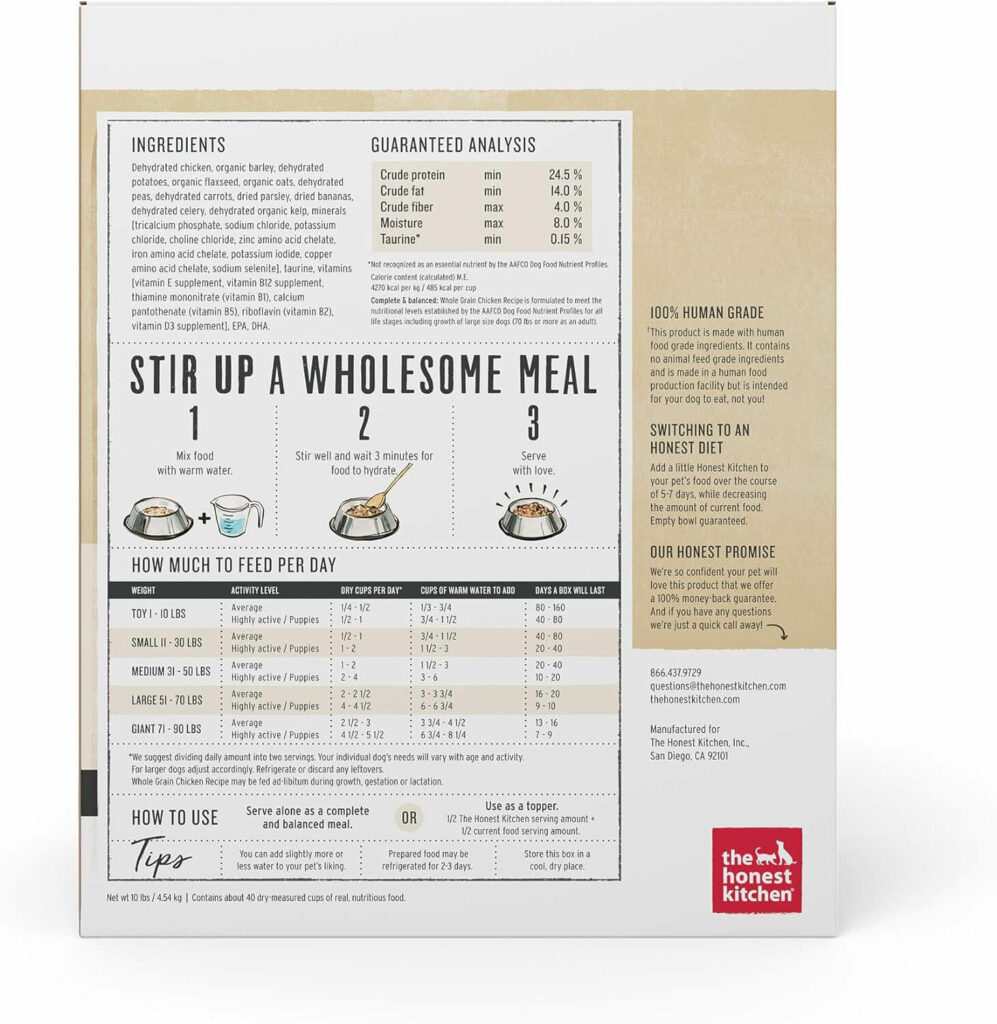
Does Honest Kitchen Cause DCM?
This is where things get a little dicey.
Unfortunately, The Honest Kitchen has been seen in veterinary-confirmed cases of nutritional DCM (which can often be reversed with diet change).
The challenge with nutritional heart disease lies in its multifaceted nature, and fortunately, it’s relatively rare. It DOES happen, however, and it is 100% preventable.
Researchers know that N-DCM is seen as a problem with boutique pet food brands that do not have a qualified nutritionist on staff, in particular, if they use a lot of peas and legumes in their formulations.
Whether we want to admit it or not, Honest Kitchen shares those risk factors.
While the Honest Kitchen has exceptional feel-good marketing and wholesome ingredients, those things may not outweigh the risks of nutritional deficiencies.
These deficiencies can be a problem no matter how ‘healthy’ and ‘high quality’ a food appears to be.
Talk to your veterinarian about diet, especially if you have a breed prone to heart disease in the first place.

Can Honest Kitchen Dog Food Be Fed to Puppies?
As with all pet foods, it’s important to verify the AAFCO statement on the bag.
The statement should say something along the lines of this: “this formula meets the nutritional levels established by the Association of American Feed Control Officials (AAFCO) for growth and development.”
Large and giant breed puppies require food where the AAFCO statement further indicates that the formula meets the nutritional levels established by the Association of American Feed Control Officials (AAFCO) for growth and development, including the growth of large breed puppies, 70+ lbs as adults.
This is because large-breed puppy foods have well-controlled calcium and energy levels.
No matter what Honest Kitchen food you choose, look for that statement.
I found one food that is appropriate for puppies (including large ones). The Honest Kitchen Food Clusters Whole Grain Chicken & Oat Recipe Puppy Blend Dog Food. There may be others.

Honest Kitchen Dog Food Review – My Take
The Honest Kitchen is a premium food that comes at a premium price point.
As with most similar foods, the added expense is more than what would truly make our pets healthy and thriving. Good marketing tells us that “high-quality human-grade food” is what we should buy when the truth is that many very affordable foods produce the same (or better) results.
I’m not convinced that pet parents should be shamed into spending big money on food like this under the guise that it would always result in a healthier, more robust pet.
However, if you have a pet that does well on expensive “human-grade” pet food, and you can afford it, there is nothing wrong with that.
I would use the clusters as training treats and the dehydrated food for stuffing enrichment toys. Honest Kitchen dehydrated food would make a great topper that is pretty close to fresh foods, while still being balanced and safe to feed.
Would I buy it? YES! Absolutely.
Would I feed it as my pet’s exclusive diet? No. I’d like to see the Honest Kitchen better adhere to WSAVA guidelines, and put to rest some of their more egregious marketing tactics.
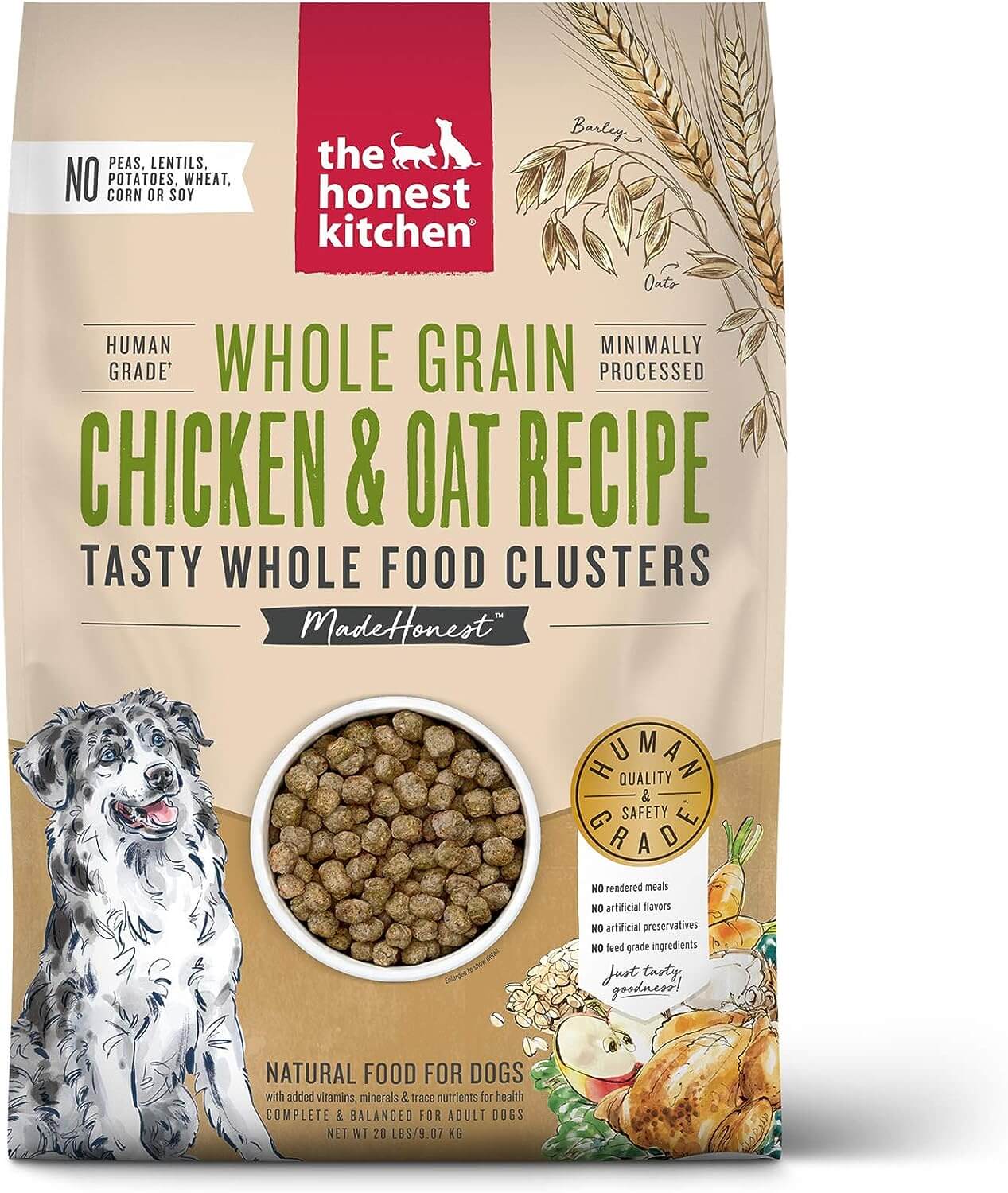
Leave a Reply